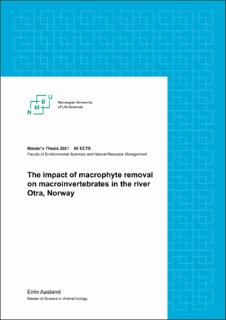The impact of macrophyte removal on macroinvertebrates in the river Otra, Norway
Master thesis
Permanent lenke
https://hdl.handle.net/11250/2788997Utgivelsesdato
2021Metadata
Vis full innførselSamlinger
- Master’s theses (MINA) [668]
Sammendrag
Aquatic macrophytes provide complex ecosystems in the freshwaters around the world. Sometimes, macrophytes can grow to very high biomasses and restrict recreational activities in which it starts being perceived as nuisance growth. Management often solves this by partially or fully removing the macrophytes. However, the full effect of macrophyte removal on the ecosystem is not fully known and often contradictive. One important feature of macrophytes is the high biodiversity of macroinvertebrates they can contain. Removing the macrophytes could potentially have negative impacts on the macroinvertebrate community inhabiting such an area. In this thesis a BACI design is used to investigate how macroinvertebrates are influenced by macrophyte removal in the oligotrophic river Otra, Norway. The river experience high Juncus bulbosus biomasses which prohibit human activities and is therefore periodically and partially removed with no knowledge of how it affects the macroinvertebrate community. Therefore, three sampling methods were used to randomly collect macroinvertebrates inhabiting the sediment, macrophytes and drift before, one week after and six weeks after macrophyte removal. Macroinvertebrate community composition had a shift after macrophyte removal. However, macrophyte removal did not affect macroinvertebrate density, diversity or taxa richness. The results of this study indicate that the management of macrophytes in the river Otra does not have a catastrophic influence on its macroinvertebrate community. In the future, how macrophyte removal affects the macroinvertebrate community in the long-term needs be investigated further. This will be important to preserve the biodiversity of the river.

